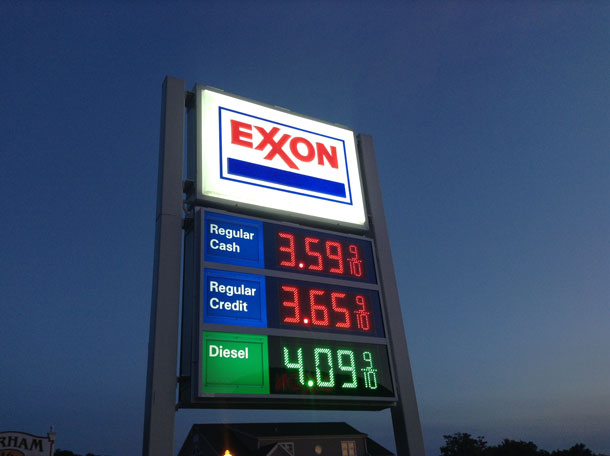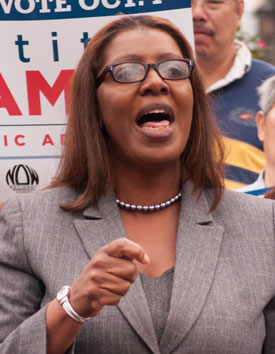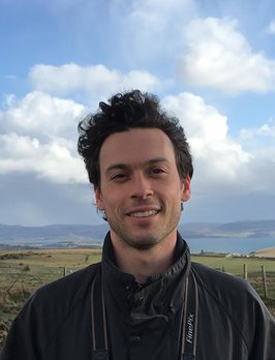ExxonMobil Fraud Decision Due
Air Date: Week of November 22, 2019

Prosecutors say ExxonMobil kept two sets of books on the effects of climate change. (Photo: Mike Mozart, Flickr CC By 2.0)
In 2018 the Attorney General of New York State filed a civil suit against multinational oil and gas corporation ExxonMobil, alleging that Exxon defrauded shareholders by using two sets of books to calculate the impact of climate change regulations on its business. At trial in October the company admitted one set of calculations was shared with shareholders and another was used internally for project planning, but said it was legal. A verdict is expected soon from the judge. Nicholas Kusnetz, a reporter for InsideClimate News, joined Host Steve Curwood to discuss the case.
Transcript
BASCOMB: From PRI and the Jennifer and Ted Stanley studios at the University of Massachusetts Boston, this is Living on Earth. I’m Bobby Bascomb.
CURWOOD: And I’m Steve Curwood.
The Attorney General of New York State alleges ExxonMobil defrauded its shareholders with a double set of books to calculate the impact of climate change regulations on its business. The NY AG filed a civil suit based on those allegations in 2018 and now the trial that began in October of this year has drawn to a close, with the verdict from the judge yet to come. Nicholas Kusnetz is a reporter for Inside Climate News, and he’s been covering the ExxonMobil trial. He joins us now. Nicholas, welcome back to Living on Earth!
KUSNETZ: Hi, it's good to be here.
CURWOOD: So, we've been covering this trial off and on since it began, but for those who aren't in the know, just quickly give us some backstory of this lawsuit.
KUSNETZ: Sure. So the lawsuit, which was filed about a year ago, came after years of investigation by New York's Attorney General into Exxon, and its practices about climate change, and what it knew and what it was saying publicly. There wasn't a ton known about what exactly was being investigated. But all of this came after reports by my organization, Inside Climate News, and also the Los Angeles Times, that looked into what Exxon knew about climate change decades ago and the science that it was funding that was showing the danger of the products that Exxon produces themselves, and the huge impact they could have on global warming.
CURWOOD: Now, how would investors have been damaged by this alleged fraud by Exxon?
KUSNETZ: So one thing to point out is: it's not about sort of, you know, the hashtag of "What Exxon Knew". The case focuses on something a little different. Really, it's a securities fraud case. The allegations are that Exxon was telling investors, essentially, that it was taking climate change much more seriously. And assuming that governments would take more action to limit emissions, while internally, it was assuming that regulation would be more limited. So that figure that it was using internally was significantly lower than what it used externally. In some cases, it actually didn't apply a cost estimate at all.
CURWOOD: And what risk was the company running by doing this?
KUSNETZ: So, the Attorney General's Office actually likened it to an insurance policy, essentially. So, the idea being that Exxon was telling investors it was taking out this big insurance policy against these regulations, when in fact it actually was not. One important effect that this had is it gave the company less incentive to shift away from high emissions projects. And in fact, there's internal emails that the Attorney General came across and its investigation that had people at Exxon talking about the two different costs and saying, okay, well, the high cost provides more incentive to invest in things like a carbon capture project, anything that cuts emissions, really. The lower cost provides less incentive for that, and of course, more incentive to continue to invest in big projects that have really high greenhouse gas emissions.
CURWOOD: And higher profits, I would imagine.
KUSNETZ: As it happens, yes.
CURWOOD: And so, if you're an employee inside Exxon, you don't want to bring the bad news to your bosses, it sounds like. You're going to go with the lower estimate, I would think.
KUSNETZ: Well, one important thing to note is that there's no dispute on the core fact that Exxon had two separate estimates. What Exxon has said is they were used for different purposes, and we had good reason to use different estimates. One of them, which they called the proxy cost, this was what they disclose to investors. They use this to model demand for oil and gas far into the future. And so that, of course, has an impact on the prices that they'll receive. The other cost estimate that we use, and this was the internal lower one, they said, we were just looking at what our own projects are going to have to pay. So this would be a direct cost on refineries, say in Texas. And so Exxon has said we had good reason for these to be different.

Letitia James is the current Attorney General for the state of New York and inherited this case against ExxonMobil from former NY AG Eric Schneiderman. (Photo: Matthew Cohen, Wikimedia Commons, CC BY 2.0)
CURWOOD: Well, that sounds realistic. So, what did the Attorney General say to pierce that bubble, to say that that's not reasonable?
KUSNETZ: The Attorney General's case is really revolving around an argument that it doesn't really matter which was right or wrong. It's not a question of what price Exxon should have put on carbon at what time. It's all about what they were telling investors. And what the attorney general has said is you have to be honest with investors, and they claim Exxon wasn't because Exxon never disclosed this lower internal cost to investors, and its own executives on the stand actually pointed to only one sentence in one report where it disclosed even the existence of this other cost. And if you read the paragraph that it's in, it's really not entirely clear that they're talking about two separate things. And, in fact, this is what a lot of the case focused on, was not these bigger questions of climate change and emissions, but on what an investor should or should not have understood from reading the company's disclosures, and whether this one-sentence disclosure is adequate.
CURWOOD: And in a gross sense, if there are two different sets of books that raises the question of well, which one is real?
KUSNETZ: Sure. And this is something that Exxon's lawyers pushed on a lot because, you know, they said, and it's true, this is all speculative. No one knows what emissions will be two years from now, let alone 10 or 20 or 30 years from now, and so Exxon has said this is all speculative, and we were just doing our best and you can't punish a company for that. But again, what the Attorney General has said is the point is not whether one is right and one is wrong. The point is whether you're being honest with investors about how you're running your business.
CURWOOD: Now, as I understand it, as the testimony phase of the trial was wrapping up, there were two counts of fraud that were withdrawn by the state. What were those charges, and what are the charges still standing for the judge to consider?
KUSNETZ: Yeah, the Attorney General's Office dropped two claims at the last minute, really, in the midst of its closing argument. And the claims that dropped would have required the Attorney General to prove that Exxon and executives knew what they were doing; that they intentionally misled investors. The remaining charges however, the Attorney General only needs to prove that Exxon did in fact mislead investors. It doesn't matter whether it was intending to do so.
CURWOOD: Let's look ahead, what might the penalties be for Exxon if it were to lose this case?
KUSNETZ: So the judge has a few options. If he does decide to rule against Exxon, he could impose fines. And while it's ultimately up to him what that fine would be, the Attorney General's Office has presented a number that it says investors essentially overpaid for Exxon stock as a result of this fraud. And that ranges from $476 million to $1.6 billion. So the judge could impose a fine, you know, using that as a guide or not, but the judge could also simply order Exxon to correct its disclosures. This is something else that the Attorney General has asked for, to issue corrective disclosures essentially, for the court to oversee new reports and disclosures to investors that would be more straightforward about how it's applying these cost estimates for carbon.
CURWOOD: And if Exxon wins this case, what might happen then?
KUSNETZ: If Exxon wins the case, I mean, I think it would certainly be a significant blow to any similar type of lawsuit. Massachusetts recently filed a lawsuit based in part on some of the same evidence and some of the same reasoning. There are also some other shareholder lawsuits, class action suits against the company along similar lines. New York, because of the way the state law is, had particularly broad powers to investigate, and there's a lower burden of proof than many other state laws to get a ruling in favor of the Attorney General. So it would be a big blow to those. I mean, more broadly, Exxon and other major oil and gas companies face more than a dozen major climate change lawsuits. They're kind of different in nature. But this case would surely get cited in those by either side, you know, whoever wins.

Nicholas Kusnetz is a reporter for Inside Climate News. (Photo: Courtesy of Inside Climate News)
CURWOOD: So, Nick, to what extent did the Attorney General make the case that this knowledge was material for investors?
KUSNETZ: So this is an important point, the judge's ruling could end up hinging entirely on this question of what you said, you know. Material is the key word. It's not enough for Exxon to just have misled investors to violate this law. It has to be that what Exxon was misleading them about was actually important to investors, that it's the kind of thing that would have led someone to buy or sell a stock, for example. And so a lot of the trial centered on this question. What the Attorney General pointed to a lot is the sort of unquestionable evidence that the investment community, broadly speaking, sees climate change as a huge risk, and in particular, for oil and gas companies as a major risk. And they pointed to their own evidence, you know, one analyst, for example, who did pick up on a little detail on the case, but this question of whether investors actually cared is going to be central to whatever the judge decides.
CURWOOD: And so if the judge decides that investors did care, then they must have lost money.
KUSNETZ: Well, then that's a third step. So, in order for the judge to issue a fine, make Exxon pay, then yes, investors had to have lost money and the Attorney General has to prove that. But even if the Attorney General is unable to prove that piece of it, and there is no fine, the judge could still say that the company violated the law and issue a sort of order for it to change its disclosures, for example, simply based on the fact that it was misleading investors about an important piece of information.
CURWOOD: Nicholas Kuznetz is a reporter for Inside Climate News. Nick, thanks so much for taking the time with us today.
KUSNETZ: Yeah, thank you for having me on the show.
Links
Click here to read Nicholas Kusnetz’s coverage of the trial
Forbes | “New York Goes Out With A Whimper In Its Case Against ExxonMobil”
Climate Liability News | “Exxon Opens Defense in New York Climate Fraud Trial”
Living on Earth wants to hear from you!
Living on Earth
62 Calef Highway, Suite 212
Lee, NH 03861
Telephone: 617-287-4121
E-mail: comments@loe.org
Newsletter [Click here]
Donate to Living on Earth!
Living on Earth is an independent media program and relies entirely on contributions from listeners and institutions supporting public service. Please donate now to preserve an independent environmental voice.
NewsletterLiving on Earth offers a weekly delivery of the show's rundown to your mailbox. Sign up for our newsletter today!
 Sailors For The Sea: Be the change you want to sea.
Sailors For The Sea: Be the change you want to sea.
 The Grantham Foundation for the Protection of the Environment: Committed to protecting and improving the health of the global environment.
The Grantham Foundation for the Protection of the Environment: Committed to protecting and improving the health of the global environment.
 Contribute to Living on Earth and receive, as our gift to you, an archival print of one of Mark Seth Lender's extraordinary wildlife photographs. Follow the link to see Mark's current collection of photographs.
Contribute to Living on Earth and receive, as our gift to you, an archival print of one of Mark Seth Lender's extraordinary wildlife photographs. Follow the link to see Mark's current collection of photographs.
 Buy a signed copy of Mark Seth Lender's book Smeagull the Seagull & support Living on Earth
Buy a signed copy of Mark Seth Lender's book Smeagull the Seagull & support Living on Earth

